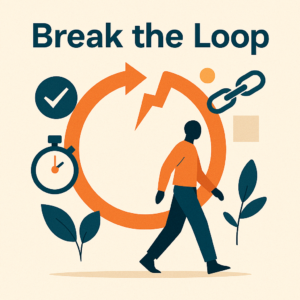🔧 Break the Loop: Everyday Tools to Overcome Behavioral Addiction

Whether it’s binge-watching, scrolling endlessly, compulsive shopping, or online gaming, behavioral addictions follow a loop: Trigger → Craving → Action → Reward → Regret.
But the good news is—you don’t need to break the entire loop in one go. You just need to interrupt it, consistently.
Let’s look at practical, science-backed tools that actually work, one day at a time.
🧠 1. Track It to Hack It
Most addictions live in denial. So the first step? Track your behavior.
-
Use apps like Forest, StayFree, Daylio, or Notion habit trackers
-
Maintain a behavior journal: time, trigger, emotion, and what happened
-
Awareness alone reduces frequency in many cases
🕒 2. Delay the Action
Introduce friction before you act.
-
Use the 5-minute rule: When you feel the urge, wait 5 minutes
-
Place the phone out of reach or uninstall easy-access apps
-
Lock away your credit cards, uninstall wallets for shopping urges
Even a 10-second pause can disrupt the cycle.
🧘 3. Breathwork and Body Resets
Cravings are not just mental—they’re physical.
-
Try Box Breathing (4-4-4-4 seconds inhale-hold-exhale-hold)
-
Progressive Muscle Relaxation: tense and release muscles head to toe
-
Get up, stretch, take a cold shower—change your state
The urge often passes once your body is calm.
🎯 4. Temptation Bundling
Pair the hard thing with a pleasant one:
-
Only listen to your favorite podcast while exercising
-
Only drink your evening coffee after 30 minutes of screen-free time
-
Watch reels only after completing your daily task list
This flips the reward structure in your favor.
👨👩👧👦 5. Accountability Systems
Tell one trusted person about your goal. Better yet, write it publicly (or privately) and share weekly updates.
Try:
-
Digital detox with a friend
-
Therapist check-ins
-
Join online support groups (Reddit, Discord, or guided communities)
What you track—and share—tends to improve.
🔁 6. If You Slip, Start Again
Relapse isn’t failure—it’s feedback. Review:
-
What triggered it?
-
How did you feel after?
-
What could you change next time?
Self-compassion is part of the cure. Judgment only feeds the cycle.
🧍Case Story: A Habit Reversal Plan in Action
S, a 35-year-old marketing consultant in Chennai, came in with screen fatigue and emotional burnout. He didn’t want to “quit everything,” just feel more present.
Together, we:
-
Tracked screen time
-
Set screen-free hours
-
Introduced real-world habits (reading, nature walks)
-
Had weekly check-ins
Six weeks later, he felt “more in charge of his time and mind.”
👨⚕️ When to Get Help
If self-help hasn’t worked, or the behavior is causing significant distress—it’s time to reach out. Therapy offers:
-
Structure
-
Emotional insight
-
Long-term habit change
CBT, ACT, Motivational Interviewing, and Habit Reversal Training are powerful tools with proven results.
📍 Find Support in Chennai
You don’t have to fight behavioral addiction alone.
Start small. Stay consistent. Reach out.
📞 Book a consultation with:
Dr. Srinivas Rajkumar T
Consultant Psychiatrist
📍Apollo Clinic – Velachery & Tambaram, Chennai
📧 srinivasaiims@gmail.com
📱 85951 55808
Let’s build better habits—one mindful choice at a time.